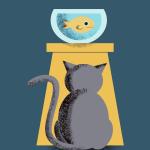Spring is the season for micro-vistas. In the winter I re-create by getting outside, in the snow, and on the best days I’m swishing down a hill paying nothing other than split second attention to the ground beneath my feet. Then, on the way back up I’ll look out…out…out: to the ridge across the canyon with it’s overhanging cornices of snow, or the summit of Mt. Baker, or Mt. Rainier. The beauty is absorbed through the macro experience. Seeing the nuances of shadow and light, of cracks in rocks, of the shadows of tree on snow are for other, slower seasons.
Those days are gone for now, and what I love about springtime is that I don’t need to move two feet in order to find immense beauty. I sit in my living room and look out the window. There’s a fir tree growing in my front yard and this is the time of year when it’s pushing the envelope: extending it’s life by bursting out fluorescent green tips on each branch in contrast to the solid, familiar evergreen that is the rest of the tree. This happens every spring, like clockwork. And every spring I marvel like a kid at a carnival. There’s more of course: Geranium blossoms are an architectural wonder and a sensual delight. I can sit with them looking at the nuances of color, the structural relationships between flower and stem, the pungent aroma and realize that suddenly 30 minutes have passed in a blink.
All this reminds me how often I go through life in a fog. You’re talking to me and I’m not listening. Music is playing, but I don’t hear it. I’m reading a paragraph, and then I need to read it again, and sometimes again, because I’m not paying attention. I’m eating food, but am so utterly out of touch with it that within a matter of hours, I can’t tell you what I ate. A Facebook ad captures me. I drop out of a meeting while my body stays in it, to check e-mail on my phone. I surf channels, and websites, and books.
Here’s the problem: Jesus teaches us that the transformation, personal growth, peace, and meaning that each of us so desperately crave comes about because of our response to revelation. The first thing then, is receiving revelation. That means learning to pay attention, and the only way one learns to pay attention is by…well, paying attention.
This sphere is one of the first projects my friend Juliet uses to teach her art students to pay attention. She shows me the nuanced movement from shadow to light that form a sort of crescent moon shape on the sphere–“That’s where it all happens,” she says with enthusiasm, and then goes on to talk about the challenges of capturing that gradation of shades in that sliver of subtle shadow.
And I thought it was just a ball. Or that that thing in my front yard was just a tree. Or those shoots in the pot just “flowers,” Geraniums if I’m really looking. Oh how little I see.
Our penchant for blindness applies to other areas of life as well. I meet a person and in moments, depending on my bent, I have her labeled: liberal, fundamentalist, gay, lost, Republican…whatever. My labels do to relationships what a chain saw does to butter: they’re a terrible, destructive tool.
To fix this I need to do certain things:
1. Spend time each day paying attention to God’s Word. Find a way to not just read, but pay attention. Try this, or try journaling, writing a thought or prayer about your reading. Breathe deeply. Read just a little, but read S-L-O-W-L-Y so that you learn (and it takes practice) to notice what’s there; be open to being astonished, shocked, changed.
2. Pay attention to something every day for a few minutes. A candle flame, a piece of music, the sunset, some new growth in your garden.
3. Pay intense attention to people. James talked about when he said we’re the best version of ourselves when we’re quick to hear, slow to speak, and slow to anger. I like that, and find that by really listening to someone, I’m plunged into deeper waters of relationships.
Be prepared though: Seeing leads to both joyful and painful discoveries, laughter and tears. Real seeing means a relentless commitment to responding to reality and that will mean some higher highs, and some lower lows. But isn’t that real life?
What have you really paid attention to lately…and how has it changed you?















